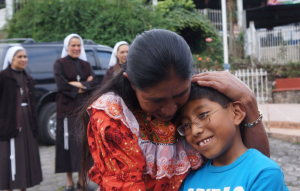
The Flickering Landscapes conference will bring scholars, filmmakers and artists to the UCF Center for Emerging Media on March 28-30, 2019 to tell the stories of immigrants and refugees. On March 29 at 7 p.m., award-winning director and producer Luis Argueta will present his 45-minute documentary ABRAZOS (Embraces), which follows the journey of 14 U.S. citizen children meeting their Guatemalan grandparents for the first time. After being separated for decades, the families finally get the chance to share stories, strengthen traditions and begin to reconstruct their cultural identities — while also exchanging lots of “abrazos” along the way.
“While filming my documentaries, I have witnessed the negative consequences of family separation caused by a broken immigration system,” says Argueta. “The ones most affected by this separation are children. There are 4.5 million U.S. citizen children living with at least one undocumented parent, and ABRAZOS tells a story about 14 of them.”
Argueta has been telling transnational immigrant stories since 1977, with ABRAZOS being the second film in his Immigration Trilogy. The first, abUSED: The Postville Raid, was featured in 13 international film festivals and premiered on PBS in December 2012. Argueta is the first and only filmmaker to be awarded Guatemala’s highest honor, Order of the Quetzal, in the degree of Grand Officer.
“In all my years working on immigration issues, [ABRAZOS] might be the most deeply moving film I have seen,” says Jeff Odenhalf from the Office for Justice, Peace and Integrity of Creation.
The first Flickering Landscapes conference was launched in 2007 to look at ways in which screens of all sorts make places become significant and “real” in the eyes of the viewers. The second conference was in 2015 and focused on Florida as a place mediated and created by screen experiences.
“The theme of migration is a little different from what we’ve done in the past,” says Dr. Bruce Janz, a philosophy professor who has helped organize the conference since its fruition along with film professor Phil Peters. “It’s still about place, but now it is about places that are absent as much as those that are present, as well as about the movement that people experience, from free movement to movement under serious duress and pain.”
Along with ABRAZOS, Flickering Landscapes will showcase other film and art exhibitions with immigration-centered themes. Dorita Hannah, an artist who teaches at the University of Auckland in New Zealand, will discuss her recent installation PhoneHome, which is comprised of videos that play on mobile phone screens housed in miniature refugee cabins. The installation represents architecture’s role in housing those without a home.
UCF School of Visual Arts and Design assistant professor Dr. Keri Watson has also curated an exhibition called Shifting Terrain: Images of Migration, which will be on display at the Center for Emerging Media. The exhibition features multimedial works by Hannah, Hiwa K, Jave Yoshimoto and Vukasian Nedeljkovc that paint a picture of the refugee experience. Hiwa K, a Kurdistani musician and artist, gave a multidisciplinary talk at UCF on February 1.
“In an age of suspicion towards those coming from somewhere else, understanding the experiences of immigrants through visual media can give us personalized narratives very different from the xenophobic rhetoric we often hear,” says Janz. “By viewing these screen experiences, we can start to understand that all of us are implicated and affected by migration in some way — if not personally then at least in our own family history — and also start asking less fearful and more constructive questions about migration.”
View the full schedule of events for the conference here.
Still image from Luis Argueta’s documentary ABRAZOS, which will be shown at Flickering Landscapes. (© Bea Gallardo)